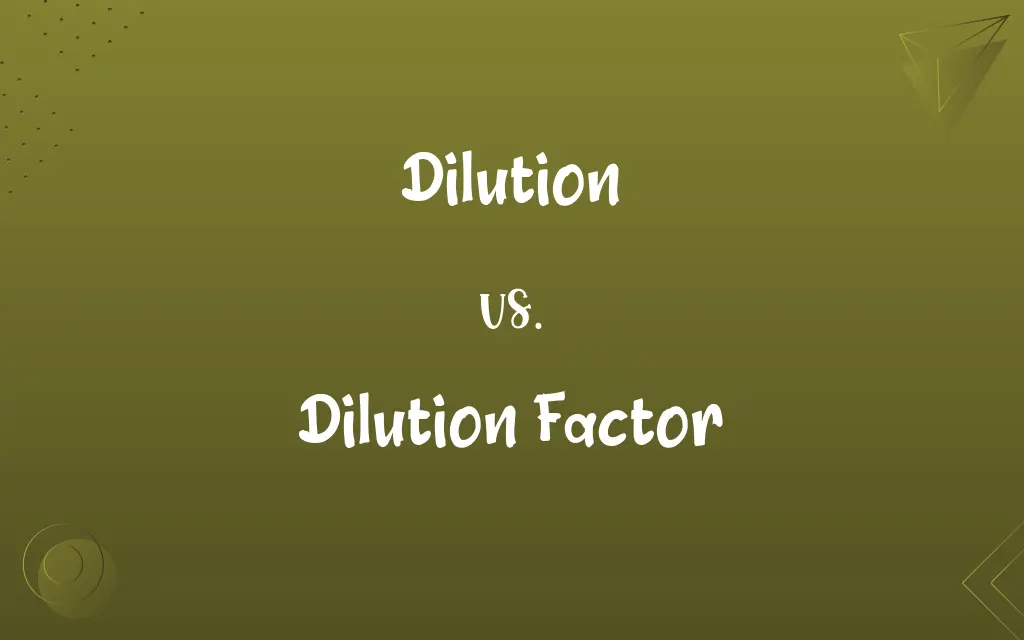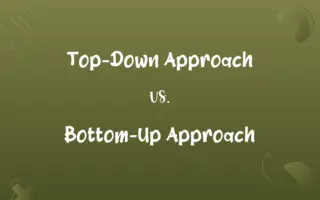Dilution vs. Dilution Factor: Know the Difference

By Shumaila Saeed & Hifza Nasir || Published on March 6, 2024
Dilution involves reducing a solute's concentration in a solution, while dilution factor is a quantification of that dilution, expressing how much the original solution has been diluted.

Key Differences
Dilution is a process commonly used in chemistry and biology to decrease the concentration of a solute in a solvent, thereby increasing the volume of the solution. The dilution factor, on the other hand, quantifies the extent of dilution. It is calculated as the ratio of the final volume of the solution to the original volume of the solution before dilution.
Shumaila Saeed
Mar 06, 2024
Dilution method is crucial for preparing solutions of desired concentrations, especially when working with substances that are too potent in their undiluted form. The dilution process can involve adding more solvent to the original solution or mixing the original solution with another solution of lower concentration. The dilution factor, numerical value helps in understanding the relationship between the concentration of the original solution and that of the diluted solution. For example, a dilution factor of 1:10 indicates that the original solution has been diluted to one-tenth of its original concentration.
Hifza Nasir
Mar 06, 2024
Dilution and dilution factor are interdependent concepts. While dilution refers to the physical process of reducing concentration, the dilution factor provides a mathematical representation of this process. The calculation of the dilution factor is essential for accurately preparing solutions in scientific experiments, ensuring that the concentrations used in experiments are precise and reproducible.
Shumaila Saeed
Mar 06, 2024
Understanding the difference between these two is crucial for laboratory work. While performing dilutions, one must not only be adept at the practical aspect of mixing solutions but also at calculating the dilution factor to ensure the desired outcome is achieved. This combination of practical skill and mathematical calculation underpins many experimental protocols in research and diagnostic laboratories.
Shumaila Saeed
Mar 06, 2024
Comparison Chart
Definition
Process of reducing solute concentration
Quantification of how much dilution occurs
Hifza Nasir
Mar 06, 2024
ADVERTISEMENT
Purpose
To achieve desired concentration
To express the ratio of volumes before and after dilution
Shumaila Saeed
Mar 06, 2024
Application
Practical laboratory technique
Mathematical representation and calculation
Shumaila Saeed
Mar 06, 2024
Outcome
Solution with lower concentration
Numerical value indicating extent of dilution
Hifza Nasir
Mar 06, 2024
Dilution and Dilution Factor Definitions
Dilution
Process of decreasing solute concentration by adding solvent.
Adding water to concentrated juice to make it drinkable.
Hifza Nasir
Feb 27, 2024
ADVERTISEMENT
Dilution Factor
Determines the concentration of the diluted solution.
A high dilution factor indicates a low concentration.
Shumaila Saeed
Feb 27, 2024
Dilution
Used to prepare solutions of specific concentrations.
Diluting a chemical for a controlled reaction.
Dua Fatima
Feb 27, 2024
Dilution Factor
Ratio indicating the extent of dilution.
A dilution factor of 1:5 means the solution is diluted five times.
Shumaila Saeed
Feb 27, 2024
Dilution
Essential for accurate experimental results.
Diluting blood samples before analysis in a lab.
Hifza Nasir
Feb 27, 2024
Dilution Factor
Calculated from final and original volumes.
Mixing 1 ml of solute with 9 ml of solvent gives a dilution factor of 1:10.
Hifza Nasir
Feb 27, 2024
ADVERTISEMENT
Dilution
Involves mixing solutions of different concentrations.
Combining a small volume of stock solution with a larger volume of water.
Shumaila Saeed
Feb 27, 2024
Dilution Factor
Crucial for replicating experimental conditions.
Using the dilution factor to prepare identical solution concentrations across tests.
Hifza Nasir
Feb 27, 2024
Dilution
Adjusts potency for safer handling and use.
Diluting cleaning chemicals before application.
Shumaila Saeed
Feb 27, 2024
Dilution Factor
Guides the preparation of standard solutions.
Achieving precise concentrations for calibration curves in spectrophotometry.
Hifza Nasir
Feb 27, 2024
Dilution
A decrease in the equity position of a share of stock because of the issuance of additional shares.
Shumaila Saeed
Jan 25, 2024
Dilution
A solution that has had additional solvent, such as water, added to it into order to make it less concentrated.
Shumaila Saeed
Jan 25, 2024
Repeatedly Asked Queries
Can the dilution factor be less than 1?
No, dilution factors represent a dilution process, thus always being equal to or greater than 1, indicating the solution has been made less concentrated.
Hifza Nasir
Mar 06, 2024
What role does the dilution factor play in analytical chemistry?
It is crucial for quantifying the concentration changes in solutions, vital for analytical measurements and calculations.
Dua Fatima
Mar 06, 2024
Why must the dilution factor be considered in experimental design?
It ensures that solutions are prepared consistently across different experiments, allowing for reproducible and accurate results.
Shumaila Saeed
Mar 06, 2024
What does a dilution factor of 1:100 mean?
It means the original solution has been diluted to 1/100th of its original concentration.
Shumaila Saeed
Mar 06, 2024
How do you calculate the dilution factor?
By dividing the final volume of the solution by the original volume before dilution.
Shumaila Saeed
Mar 06, 2024
How does dilution affect the potency of a solution?
Dilution decreases the solution's potency by reducing the concentration of the active solute.
Shumaila Saeed
Mar 06, 2024
Is it possible to reverse a dilution?
Practically, reversing a dilution by concentrating the solution again can be challenging and often impractical, especially if the solvent has been significantly increased.
Dua Fatima
Mar 06, 2024
How does dilution impact the volume of a solution?
Dilution increases the total volume of the solution while decreasing the solute's concentration.
Shumaila Saeed
Mar 06, 2024
Why is dilution important in laboratories?
Dilution is essential for preparing solutions of manageable concentrations, ensuring safe handling, and achieving accurate experimental results.
Hifza Nasir
Mar 06, 2024
Can dilution affect the chemical properties of a solution?
While dilution changes the concentration, the intrinsic chemical properties of the solute remain unchanged; however, the reaction kinetics and dynamics can be affected.
Dua Fatima
Mar 06, 2024
Share this page
Link for your blog / website
HTML
Link to share via messenger
About Author
Written by
Shumaila SaeedShumaila Saeed, an expert content creator with 6 years of experience, specializes in distilling complex topics into easily digestible comparisons, shining a light on the nuances that both inform and educate readers with clarity and accuracy.
Co-written by
Hifza Nasir







































































